Ethical Issues in Nursing: Case Study of Jessica Wilson's Pregnancy
VerifiedAdded on 2022/11/14
|7
|2102
|132
Case Study
AI Summary
This case study analyzes an ethical dilemma faced by a registered nurse (RN) named Sam, involving a 15-year-old patient, Jessica Wilson, who is pregnant and requests confidentiality from her mother. The assignment explores the conflict between ethical principles such as autonomy, confidentiality, beneficence, veracity, informed consent, and non-maleficence. The student examines the RN's responsibilities, potential courses of action, and the application of the ICN code of ethics. The student argues for informing the mother to ensure the patient's well-being, supporting this decision with legal and ethical considerations, and referencing relevant studies and codes of ethics to justify the chosen course of action. The assignment highlights the importance of making informed decisions that prioritize patient health while adhering to legal and ethical standards.
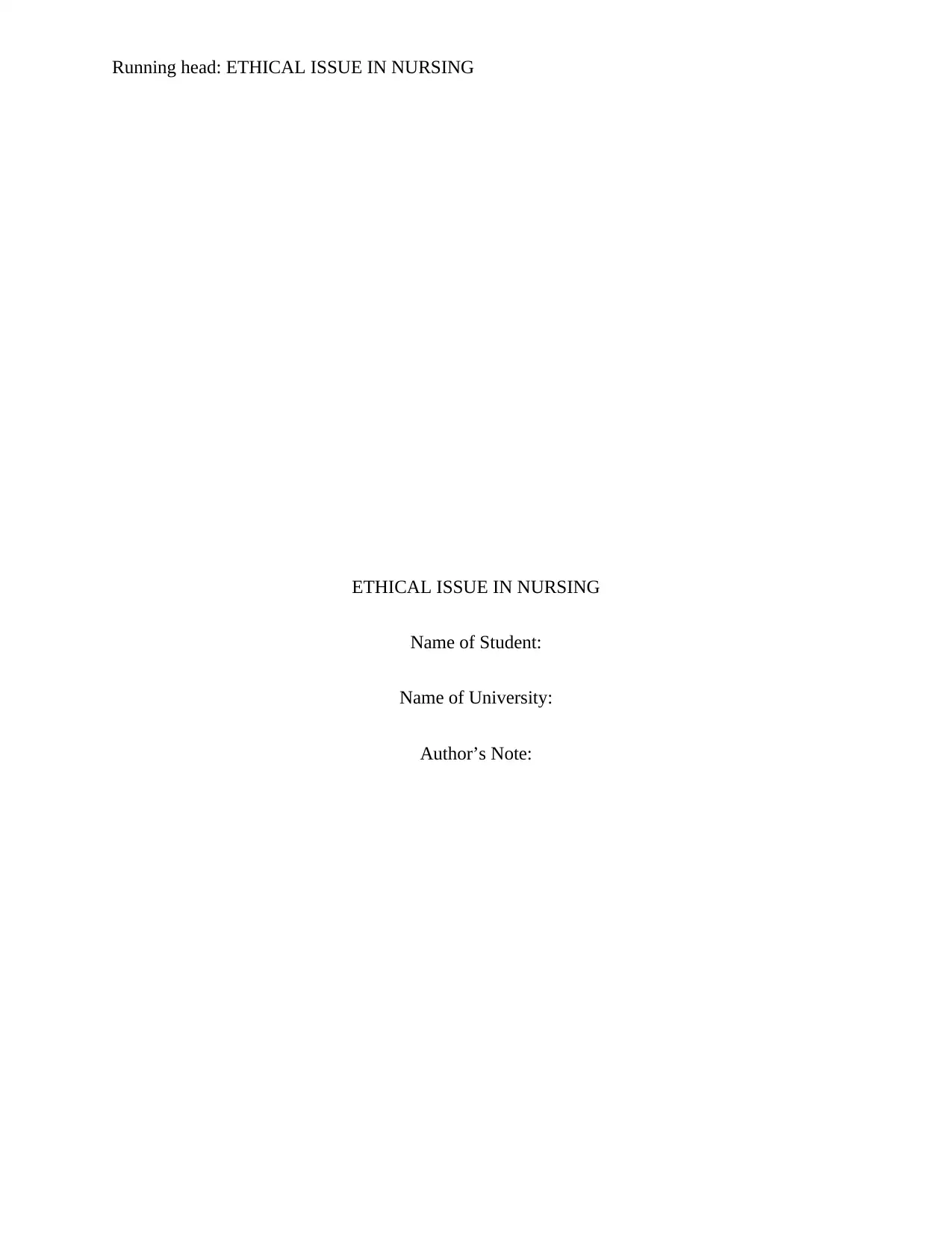
Running head: ETHICAL ISSUE IN NURSING
ETHICAL ISSUE IN NURSING
Name of Student:
Name of University:
Author’s Note:
ETHICAL ISSUE IN NURSING
Name of Student:
Name of University:
Author’s Note:
Paraphrase This Document
Need a fresh take? Get an instant paraphrase of this document with our AI Paraphraser
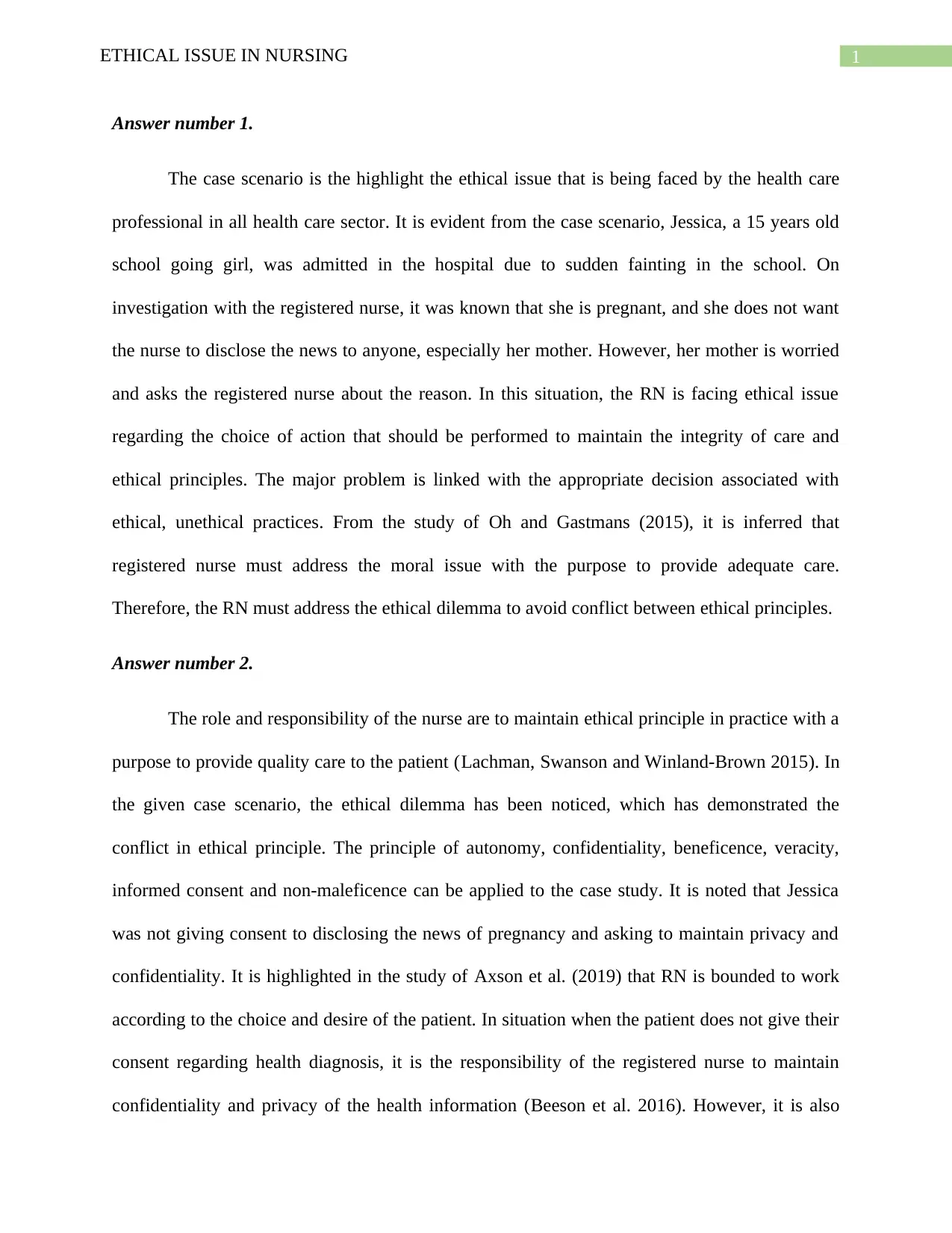
1ETHICAL ISSUE IN NURSING
Answer number 1.
The case scenario is the highlight the ethical issue that is being faced by the health care
professional in all health care sector. It is evident from the case scenario, Jessica, a 15 years old
school going girl, was admitted in the hospital due to sudden fainting in the school. On
investigation with the registered nurse, it was known that she is pregnant, and she does not want
the nurse to disclose the news to anyone, especially her mother. However, her mother is worried
and asks the registered nurse about the reason. In this situation, the RN is facing ethical issue
regarding the choice of action that should be performed to maintain the integrity of care and
ethical principles. The major problem is linked with the appropriate decision associated with
ethical, unethical practices. From the study of Oh and Gastmans (2015), it is inferred that
registered nurse must address the moral issue with the purpose to provide adequate care.
Therefore, the RN must address the ethical dilemma to avoid conflict between ethical principles.
Answer number 2.
The role and responsibility of the nurse are to maintain ethical principle in practice with a
purpose to provide quality care to the patient (Lachman, Swanson and Winland-Brown 2015). In
the given case scenario, the ethical dilemma has been noticed, which has demonstrated the
conflict in ethical principle. The principle of autonomy, confidentiality, beneficence, veracity,
informed consent and non-maleficence can be applied to the case study. It is noted that Jessica
was not giving consent to disclosing the news of pregnancy and asking to maintain privacy and
confidentiality. It is highlighted in the study of Axson et al. (2019) that RN is bounded to work
according to the choice and desire of the patient. In situation when the patient does not give their
consent regarding health diagnosis, it is the responsibility of the registered nurse to maintain
confidentiality and privacy of the health information (Beeson et al. 2016). However, it is also
Answer number 1.
The case scenario is the highlight the ethical issue that is being faced by the health care
professional in all health care sector. It is evident from the case scenario, Jessica, a 15 years old
school going girl, was admitted in the hospital due to sudden fainting in the school. On
investigation with the registered nurse, it was known that she is pregnant, and she does not want
the nurse to disclose the news to anyone, especially her mother. However, her mother is worried
and asks the registered nurse about the reason. In this situation, the RN is facing ethical issue
regarding the choice of action that should be performed to maintain the integrity of care and
ethical principles. The major problem is linked with the appropriate decision associated with
ethical, unethical practices. From the study of Oh and Gastmans (2015), it is inferred that
registered nurse must address the moral issue with the purpose to provide adequate care.
Therefore, the RN must address the ethical dilemma to avoid conflict between ethical principles.
Answer number 2.
The role and responsibility of the nurse are to maintain ethical principle in practice with a
purpose to provide quality care to the patient (Lachman, Swanson and Winland-Brown 2015). In
the given case scenario, the ethical dilemma has been noticed, which has demonstrated the
conflict in ethical principle. The principle of autonomy, confidentiality, beneficence, veracity,
informed consent and non-maleficence can be applied to the case study. It is noted that Jessica
was not giving consent to disclosing the news of pregnancy and asking to maintain privacy and
confidentiality. It is highlighted in the study of Axson et al. (2019) that RN is bounded to work
according to the choice and desire of the patient. In situation when the patient does not give their
consent regarding health diagnosis, it is the responsibility of the registered nurse to maintain
confidentiality and privacy of the health information (Beeson et al. 2016). However, it is also
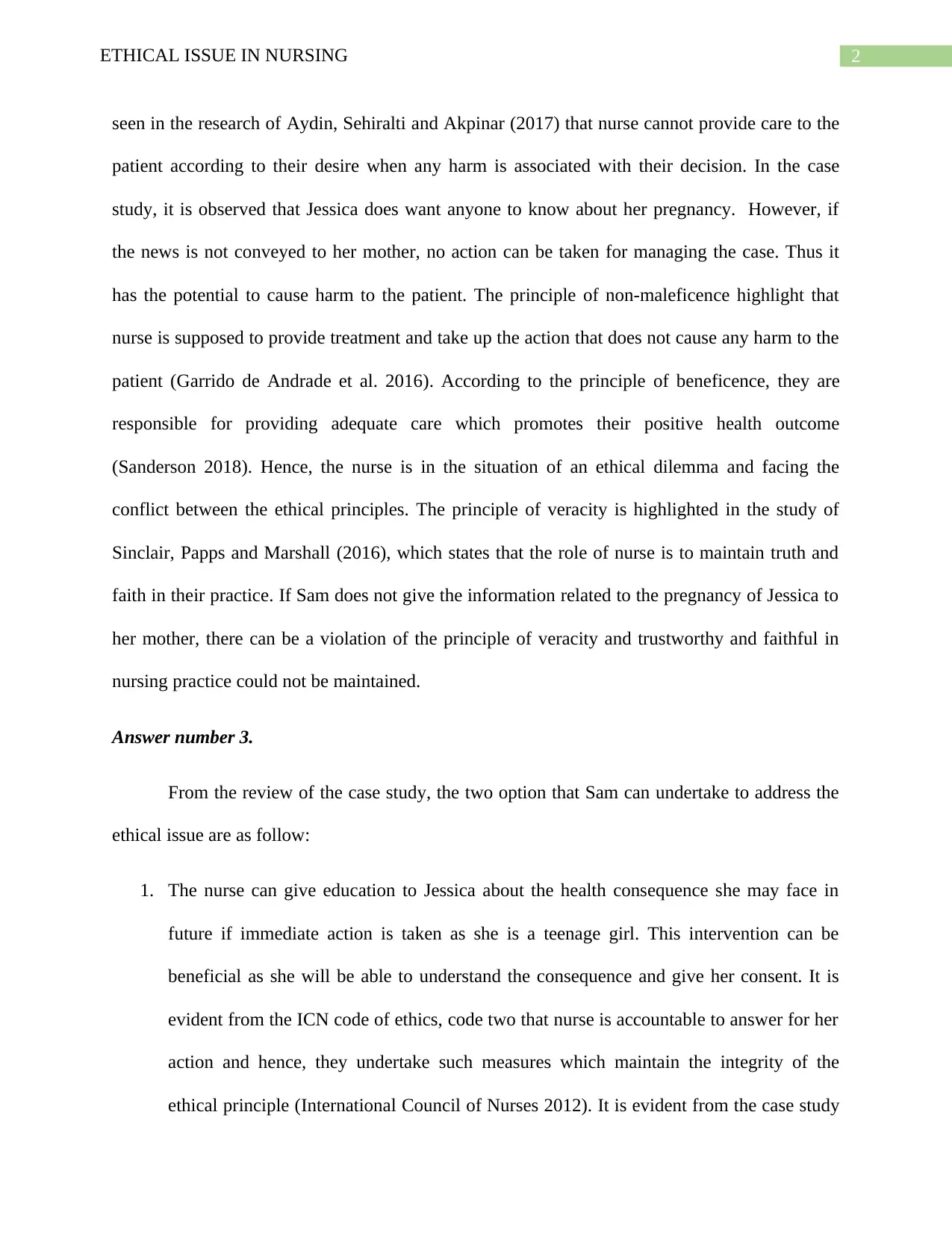
2ETHICAL ISSUE IN NURSING
seen in the research of Aydin, Sehiralti and Akpinar (2017) that nurse cannot provide care to the
patient according to their desire when any harm is associated with their decision. In the case
study, it is observed that Jessica does want anyone to know about her pregnancy. However, if
the news is not conveyed to her mother, no action can be taken for managing the case. Thus it
has the potential to cause harm to the patient. The principle of non-maleficence highlight that
nurse is supposed to provide treatment and take up the action that does not cause any harm to the
patient (Garrido de Andrade et al. 2016). According to the principle of beneficence, they are
responsible for providing adequate care which promotes their positive health outcome
(Sanderson 2018). Hence, the nurse is in the situation of an ethical dilemma and facing the
conflict between the ethical principles. The principle of veracity is highlighted in the study of
Sinclair, Papps and Marshall (2016), which states that the role of nurse is to maintain truth and
faith in their practice. If Sam does not give the information related to the pregnancy of Jessica to
her mother, there can be a violation of the principle of veracity and trustworthy and faithful in
nursing practice could not be maintained.
Answer number 3.
From the review of the case study, the two option that Sam can undertake to address the
ethical issue are as follow:
1. The nurse can give education to Jessica about the health consequence she may face in
future if immediate action is taken as she is a teenage girl. This intervention can be
beneficial as she will be able to understand the consequence and give her consent. It is
evident from the ICN code of ethics, code two that nurse is accountable to answer for her
action and hence, they undertake such measures which maintain the integrity of the
ethical principle (International Council of Nurses 2012). It is evident from the case study
seen in the research of Aydin, Sehiralti and Akpinar (2017) that nurse cannot provide care to the
patient according to their desire when any harm is associated with their decision. In the case
study, it is observed that Jessica does want anyone to know about her pregnancy. However, if
the news is not conveyed to her mother, no action can be taken for managing the case. Thus it
has the potential to cause harm to the patient. The principle of non-maleficence highlight that
nurse is supposed to provide treatment and take up the action that does not cause any harm to the
patient (Garrido de Andrade et al. 2016). According to the principle of beneficence, they are
responsible for providing adequate care which promotes their positive health outcome
(Sanderson 2018). Hence, the nurse is in the situation of an ethical dilemma and facing the
conflict between the ethical principles. The principle of veracity is highlighted in the study of
Sinclair, Papps and Marshall (2016), which states that the role of nurse is to maintain truth and
faith in their practice. If Sam does not give the information related to the pregnancy of Jessica to
her mother, there can be a violation of the principle of veracity and trustworthy and faithful in
nursing practice could not be maintained.
Answer number 3.
From the review of the case study, the two option that Sam can undertake to address the
ethical issue are as follow:
1. The nurse can give education to Jessica about the health consequence she may face in
future if immediate action is taken as she is a teenage girl. This intervention can be
beneficial as she will be able to understand the consequence and give her consent. It is
evident from the ICN code of ethics, code two that nurse is accountable to answer for her
action and hence, they undertake such measures which maintain the integrity of the
ethical principle (International Council of Nurses 2012). It is evident from the case study
⊘ This is a preview!⊘
Do you want full access?
Subscribe today to unlock all pages.

Trusted by 1+ million students worldwide
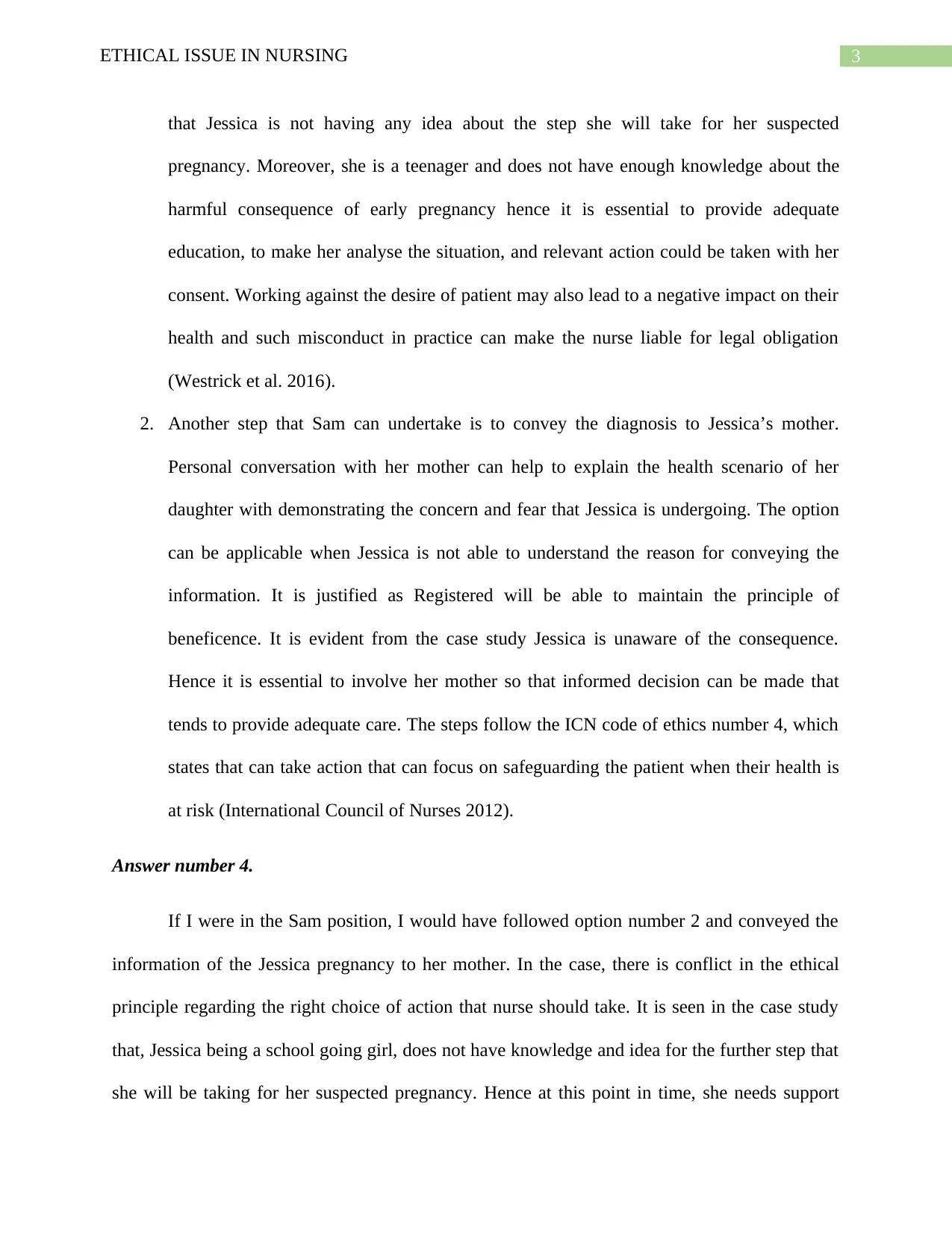
3ETHICAL ISSUE IN NURSING
that Jessica is not having any idea about the step she will take for her suspected
pregnancy. Moreover, she is a teenager and does not have enough knowledge about the
harmful consequence of early pregnancy hence it is essential to provide adequate
education, to make her analyse the situation, and relevant action could be taken with her
consent. Working against the desire of patient may also lead to a negative impact on their
health and such misconduct in practice can make the nurse liable for legal obligation
(Westrick et al. 2016).
2. Another step that Sam can undertake is to convey the diagnosis to Jessica’s mother.
Personal conversation with her mother can help to explain the health scenario of her
daughter with demonstrating the concern and fear that Jessica is undergoing. The option
can be applicable when Jessica is not able to understand the reason for conveying the
information. It is justified as Registered will be able to maintain the principle of
beneficence. It is evident from the case study Jessica is unaware of the consequence.
Hence it is essential to involve her mother so that informed decision can be made that
tends to provide adequate care. The steps follow the ICN code of ethics number 4, which
states that can take action that can focus on safeguarding the patient when their health is
at risk (International Council of Nurses 2012).
Answer number 4.
If I were in the Sam position, I would have followed option number 2 and conveyed the
information of the Jessica pregnancy to her mother. In the case, there is conflict in the ethical
principle regarding the right choice of action that nurse should take. It is seen in the case study
that, Jessica being a school going girl, does not have knowledge and idea for the further step that
she will be taking for her suspected pregnancy. Hence at this point in time, she needs support
that Jessica is not having any idea about the step she will take for her suspected
pregnancy. Moreover, she is a teenager and does not have enough knowledge about the
harmful consequence of early pregnancy hence it is essential to provide adequate
education, to make her analyse the situation, and relevant action could be taken with her
consent. Working against the desire of patient may also lead to a negative impact on their
health and such misconduct in practice can make the nurse liable for legal obligation
(Westrick et al. 2016).
2. Another step that Sam can undertake is to convey the diagnosis to Jessica’s mother.
Personal conversation with her mother can help to explain the health scenario of her
daughter with demonstrating the concern and fear that Jessica is undergoing. The option
can be applicable when Jessica is not able to understand the reason for conveying the
information. It is justified as Registered will be able to maintain the principle of
beneficence. It is evident from the case study Jessica is unaware of the consequence.
Hence it is essential to involve her mother so that informed decision can be made that
tends to provide adequate care. The steps follow the ICN code of ethics number 4, which
states that can take action that can focus on safeguarding the patient when their health is
at risk (International Council of Nurses 2012).
Answer number 4.
If I were in the Sam position, I would have followed option number 2 and conveyed the
information of the Jessica pregnancy to her mother. In the case, there is conflict in the ethical
principle regarding the right choice of action that nurse should take. It is seen in the case study
that, Jessica being a school going girl, does not have knowledge and idea for the further step that
she will be taking for her suspected pregnancy. Hence at this point in time, she needs support
Paraphrase This Document
Need a fresh take? Get an instant paraphrase of this document with our AI Paraphraser
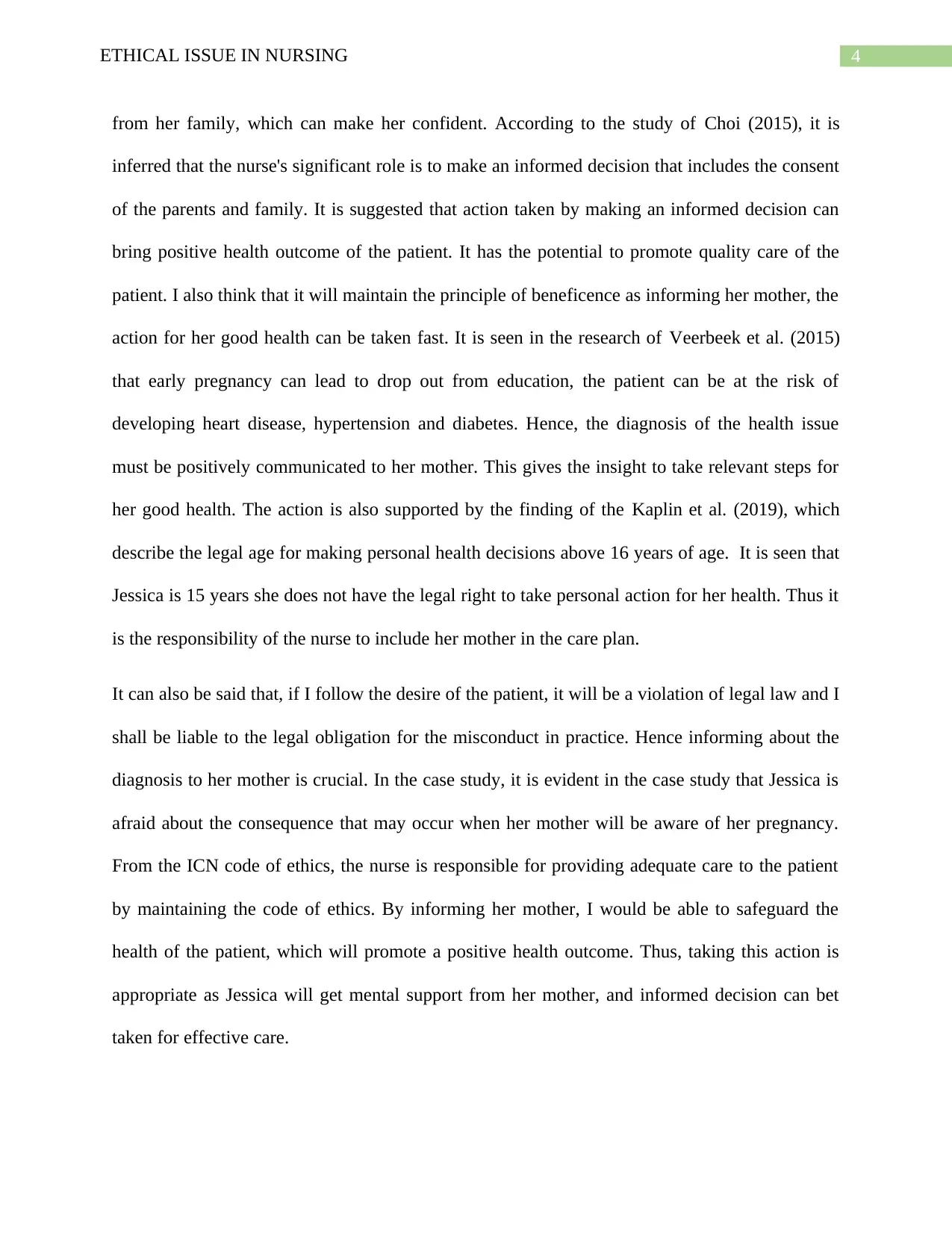
4ETHICAL ISSUE IN NURSING
from her family, which can make her confident. According to the study of Choi (2015), it is
inferred that the nurse's significant role is to make an informed decision that includes the consent
of the parents and family. It is suggested that action taken by making an informed decision can
bring positive health outcome of the patient. It has the potential to promote quality care of the
patient. I also think that it will maintain the principle of beneficence as informing her mother, the
action for her good health can be taken fast. It is seen in the research of Veerbeek et al. (2015)
that early pregnancy can lead to drop out from education, the patient can be at the risk of
developing heart disease, hypertension and diabetes. Hence, the diagnosis of the health issue
must be positively communicated to her mother. This gives the insight to take relevant steps for
her good health. The action is also supported by the finding of the Kaplin et al. (2019), which
describe the legal age for making personal health decisions above 16 years of age. It is seen that
Jessica is 15 years she does not have the legal right to take personal action for her health. Thus it
is the responsibility of the nurse to include her mother in the care plan.
It can also be said that, if I follow the desire of the patient, it will be a violation of legal law and I
shall be liable to the legal obligation for the misconduct in practice. Hence informing about the
diagnosis to her mother is crucial. In the case study, it is evident in the case study that Jessica is
afraid about the consequence that may occur when her mother will be aware of her pregnancy.
From the ICN code of ethics, the nurse is responsible for providing adequate care to the patient
by maintaining the code of ethics. By informing her mother, I would be able to safeguard the
health of the patient, which will promote a positive health outcome. Thus, taking this action is
appropriate as Jessica will get mental support from her mother, and informed decision can bet
taken for effective care.
from her family, which can make her confident. According to the study of Choi (2015), it is
inferred that the nurse's significant role is to make an informed decision that includes the consent
of the parents and family. It is suggested that action taken by making an informed decision can
bring positive health outcome of the patient. It has the potential to promote quality care of the
patient. I also think that it will maintain the principle of beneficence as informing her mother, the
action for her good health can be taken fast. It is seen in the research of Veerbeek et al. (2015)
that early pregnancy can lead to drop out from education, the patient can be at the risk of
developing heart disease, hypertension and diabetes. Hence, the diagnosis of the health issue
must be positively communicated to her mother. This gives the insight to take relevant steps for
her good health. The action is also supported by the finding of the Kaplin et al. (2019), which
describe the legal age for making personal health decisions above 16 years of age. It is seen that
Jessica is 15 years she does not have the legal right to take personal action for her health. Thus it
is the responsibility of the nurse to include her mother in the care plan.
It can also be said that, if I follow the desire of the patient, it will be a violation of legal law and I
shall be liable to the legal obligation for the misconduct in practice. Hence informing about the
diagnosis to her mother is crucial. In the case study, it is evident in the case study that Jessica is
afraid about the consequence that may occur when her mother will be aware of her pregnancy.
From the ICN code of ethics, the nurse is responsible for providing adequate care to the patient
by maintaining the code of ethics. By informing her mother, I would be able to safeguard the
health of the patient, which will promote a positive health outcome. Thus, taking this action is
appropriate as Jessica will get mental support from her mother, and informed decision can bet
taken for effective care.
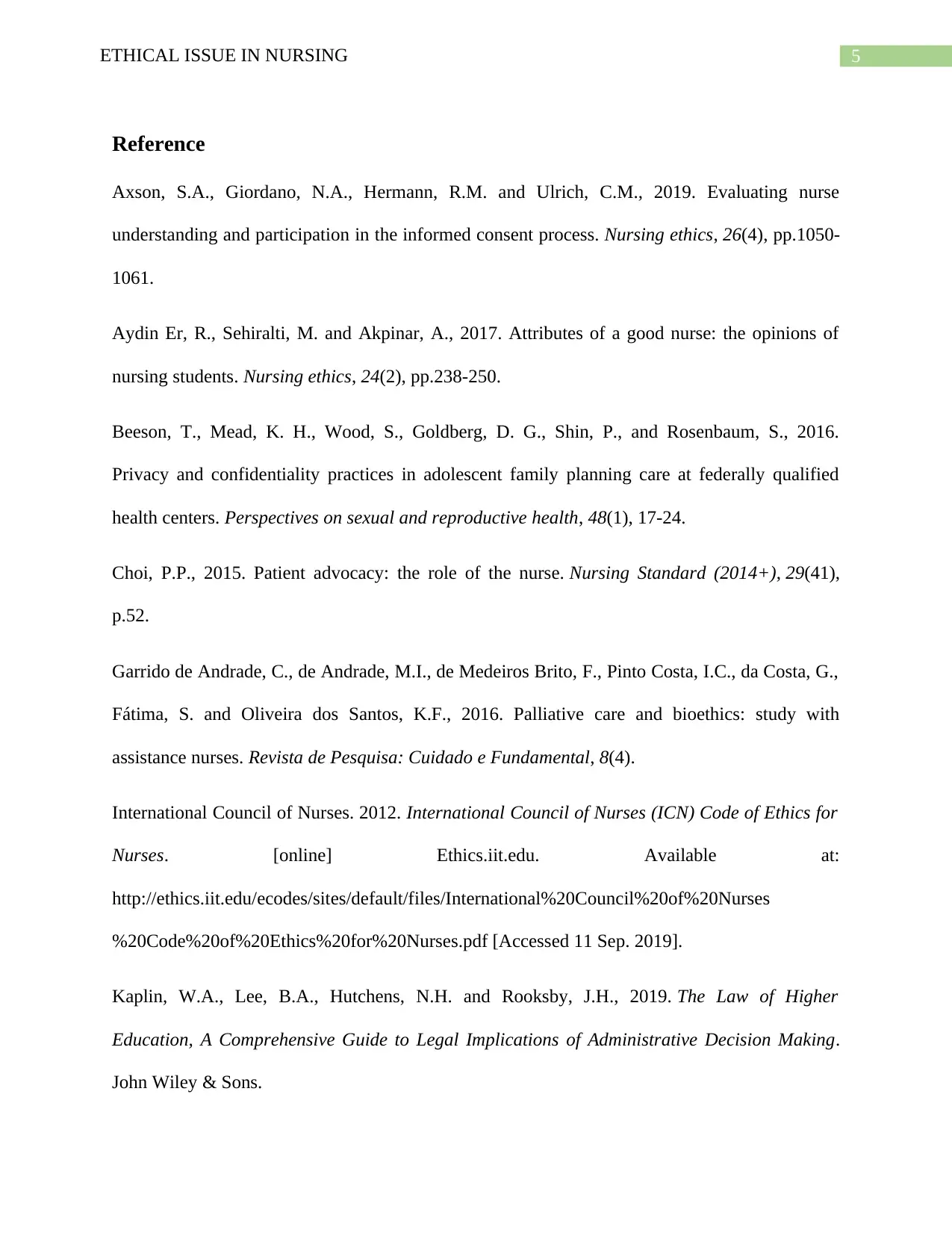
5ETHICAL ISSUE IN NURSING
Reference
Axson, S.A., Giordano, N.A., Hermann, R.M. and Ulrich, C.M., 2019. Evaluating nurse
understanding and participation in the informed consent process. Nursing ethics, 26(4), pp.1050-
1061.
Aydin Er, R., Sehiralti, M. and Akpinar, A., 2017. Attributes of a good nurse: the opinions of
nursing students. Nursing ethics, 24(2), pp.238-250.
Beeson, T., Mead, K. H., Wood, S., Goldberg, D. G., Shin, P., and Rosenbaum, S., 2016.
Privacy and confidentiality practices in adolescent family planning care at federally qualified
health centers. Perspectives on sexual and reproductive health, 48(1), 17-24.
Choi, P.P., 2015. Patient advocacy: the role of the nurse. Nursing Standard (2014+), 29(41),
p.52.
Garrido de Andrade, C., de Andrade, M.I., de Medeiros Brito, F., Pinto Costa, I.C., da Costa, G.,
Fátima, S. and Oliveira dos Santos, K.F., 2016. Palliative care and bioethics: study with
assistance nurses. Revista de Pesquisa: Cuidado e Fundamental, 8(4).
International Council of Nurses. 2012. International Council of Nurses (ICN) Code of Ethics for
Nurses. [online] Ethics.iit.edu. Available at:
http://ethics.iit.edu/ecodes/sites/default/files/International%20Council%20of%20Nurses
%20Code%20of%20Ethics%20for%20Nurses.pdf [Accessed 11 Sep. 2019].
Kaplin, W.A., Lee, B.A., Hutchens, N.H. and Rooksby, J.H., 2019. The Law of Higher
Education, A Comprehensive Guide to Legal Implications of Administrative Decision Making.
John Wiley & Sons.
Reference
Axson, S.A., Giordano, N.A., Hermann, R.M. and Ulrich, C.M., 2019. Evaluating nurse
understanding and participation in the informed consent process. Nursing ethics, 26(4), pp.1050-
1061.
Aydin Er, R., Sehiralti, M. and Akpinar, A., 2017. Attributes of a good nurse: the opinions of
nursing students. Nursing ethics, 24(2), pp.238-250.
Beeson, T., Mead, K. H., Wood, S., Goldberg, D. G., Shin, P., and Rosenbaum, S., 2016.
Privacy and confidentiality practices in adolescent family planning care at federally qualified
health centers. Perspectives on sexual and reproductive health, 48(1), 17-24.
Choi, P.P., 2015. Patient advocacy: the role of the nurse. Nursing Standard (2014+), 29(41),
p.52.
Garrido de Andrade, C., de Andrade, M.I., de Medeiros Brito, F., Pinto Costa, I.C., da Costa, G.,
Fátima, S. and Oliveira dos Santos, K.F., 2016. Palliative care and bioethics: study with
assistance nurses. Revista de Pesquisa: Cuidado e Fundamental, 8(4).
International Council of Nurses. 2012. International Council of Nurses (ICN) Code of Ethics for
Nurses. [online] Ethics.iit.edu. Available at:
http://ethics.iit.edu/ecodes/sites/default/files/International%20Council%20of%20Nurses
%20Code%20of%20Ethics%20for%20Nurses.pdf [Accessed 11 Sep. 2019].
Kaplin, W.A., Lee, B.A., Hutchens, N.H. and Rooksby, J.H., 2019. The Law of Higher
Education, A Comprehensive Guide to Legal Implications of Administrative Decision Making.
John Wiley & Sons.
⊘ This is a preview!⊘
Do you want full access?
Subscribe today to unlock all pages.

Trusted by 1+ million students worldwide
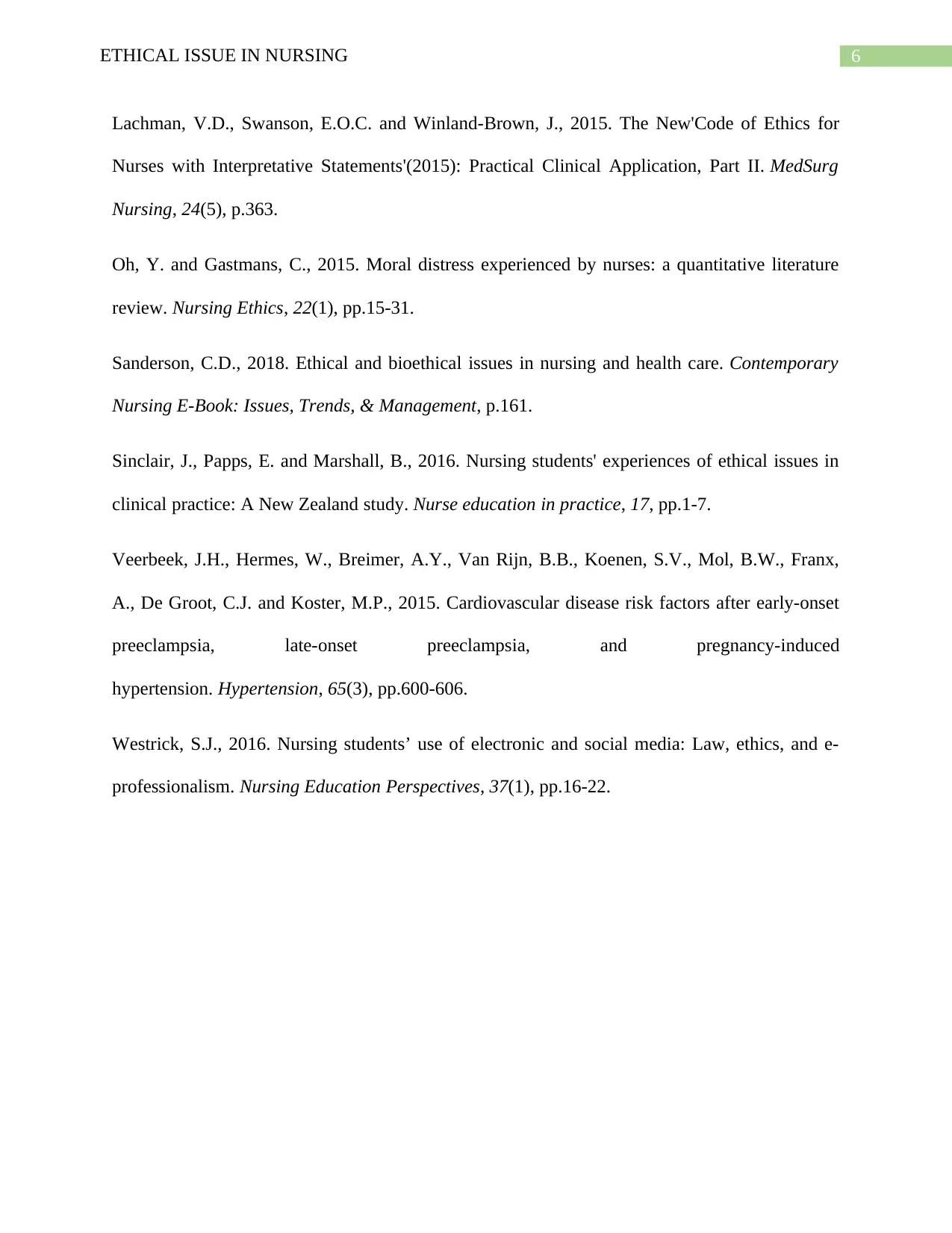
6ETHICAL ISSUE IN NURSING
Lachman, V.D., Swanson, E.O.C. and Winland-Brown, J., 2015. The New'Code of Ethics for
Nurses with Interpretative Statements'(2015): Practical Clinical Application, Part II. MedSurg
Nursing, 24(5), p.363.
Oh, Y. and Gastmans, C., 2015. Moral distress experienced by nurses: a quantitative literature
review. Nursing Ethics, 22(1), pp.15-31.
Sanderson, C.D., 2018. Ethical and bioethical issues in nursing and health care. Contemporary
Nursing E-Book: Issues, Trends, & Management, p.161.
Sinclair, J., Papps, E. and Marshall, B., 2016. Nursing students' experiences of ethical issues in
clinical practice: A New Zealand study. Nurse education in practice, 17, pp.1-7.
Veerbeek, J.H., Hermes, W., Breimer, A.Y., Van Rijn, B.B., Koenen, S.V., Mol, B.W., Franx,
A., De Groot, C.J. and Koster, M.P., 2015. Cardiovascular disease risk factors after early-onset
preeclampsia, late-onset preeclampsia, and pregnancy-induced
hypertension. Hypertension, 65(3), pp.600-606.
Westrick, S.J., 2016. Nursing students’ use of electronic and social media: Law, ethics, and e-
professionalism. Nursing Education Perspectives, 37(1), pp.16-22.
Lachman, V.D., Swanson, E.O.C. and Winland-Brown, J., 2015. The New'Code of Ethics for
Nurses with Interpretative Statements'(2015): Practical Clinical Application, Part II. MedSurg
Nursing, 24(5), p.363.
Oh, Y. and Gastmans, C., 2015. Moral distress experienced by nurses: a quantitative literature
review. Nursing Ethics, 22(1), pp.15-31.
Sanderson, C.D., 2018. Ethical and bioethical issues in nursing and health care. Contemporary
Nursing E-Book: Issues, Trends, & Management, p.161.
Sinclair, J., Papps, E. and Marshall, B., 2016. Nursing students' experiences of ethical issues in
clinical practice: A New Zealand study. Nurse education in practice, 17, pp.1-7.
Veerbeek, J.H., Hermes, W., Breimer, A.Y., Van Rijn, B.B., Koenen, S.V., Mol, B.W., Franx,
A., De Groot, C.J. and Koster, M.P., 2015. Cardiovascular disease risk factors after early-onset
preeclampsia, late-onset preeclampsia, and pregnancy-induced
hypertension. Hypertension, 65(3), pp.600-606.
Westrick, S.J., 2016. Nursing students’ use of electronic and social media: Law, ethics, and e-
professionalism. Nursing Education Perspectives, 37(1), pp.16-22.
1 out of 7
Related Documents
Your All-in-One AI-Powered Toolkit for Academic Success.
+13062052269
info@desklib.com
Available 24*7 on WhatsApp / Email
![[object Object]](/_next/static/media/star-bottom.7253800d.svg)
Unlock your academic potential
Copyright © 2020–2026 A2Z Services. All Rights Reserved. Developed and managed by ZUCOL.





